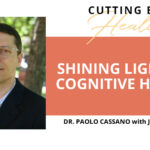
This past month, the Cutting Edge Health: Preventing Cognitive Decline project reached an important and exciting milestone! We crossed the 1-million-view threshold on YouTube! A big shout out to all of you for caring about your health, wanting more information on how to optimize it, and using this podcast to get you there! Thank you, also, to our podcast guests who so generously shared their time and knowledge.
Our team started this to help people, and in reaching this milestone, I think the effort is succeeding. We’re learning a lot, too, applying much of it to our lives, and our health is improving! At this welcomed crossroad, I couldn’t be more grateful to our team: Alan Olmstead, who is a pro’s pro when it comes to editing video and audio; Maria Connor, who compiles this newsletter and manages the cuttingedgehealth.com website; and Nicole Riggs, who saw this vision from its first day and set everything in place for its success.
And, now here are the research findings about preventing cognitive decline that caught my eye this past month.
Physicians suggest that a brief 3-minute test could uncover your risk of developing dementia. The new McCance Brain Care Score from a Harvard-associated health system might motivate you to make some changes for your brain health. Click here to download the scorecard for you to use. The higher the score the better job you’re doing of helping your brain.
As organisms age, senescent cells build up and contribute to tissue decline. Deleting these cells can improve age-related problems like metabolic issues, cognitive decline, and decreased fitness. A new therapy has been developed using special immune cells that target and eliminate these senescent cells safely. Think of it as a good spring cleaning. This therapy improves health in aging animals with long-lasting effects after just one treatment. Click here to read the original research published in Nature Aging. Here is a BBC report on the findings.
Sitting in traffic daily may increase the buildup of Alzheimer’s plaque in the brain, according to a study. Researchers found that those spending more time in Atlanta’s traffic had higher levels of amyloid plaque, a hallmark of Alzheimer’s. Smog is to blame. The study was published in Neurology. Here’s a write-up about the findings.
Researchers in Chicago are studying how to slow aging and their 6-minute story was on NPR’s Morning Edition recently.
A breakthrough in dementia research from UC Berkeley promises to revolutionize how we treat neurodegenerative disease. Most research into treatments focused on breaking up abnormal protein clumps has shown little success. But new research, published in the journal Nature, suggests that these protein accumulations may not actually be responsible for killing our brain cells. Rather, it appears the brain cells are dying due to the body’s own failure to turn off their stress response. Here’s the article in Newsweek.
A recent UK study published in the journal Neurology found links between sleep regularity scores and risk of dementia. Compared to those with an average sleep regularity index, the risk of dementia was highest for people who had the most irregular sleep. Here’s a write-up about it in PsyPost.
Finally, if you’re a lucky one, your brain might compensate somewhat for age-related mental decline, but it doesn’t happen with everyone. Here’s a write-up about the research. And you can read the original research here.












